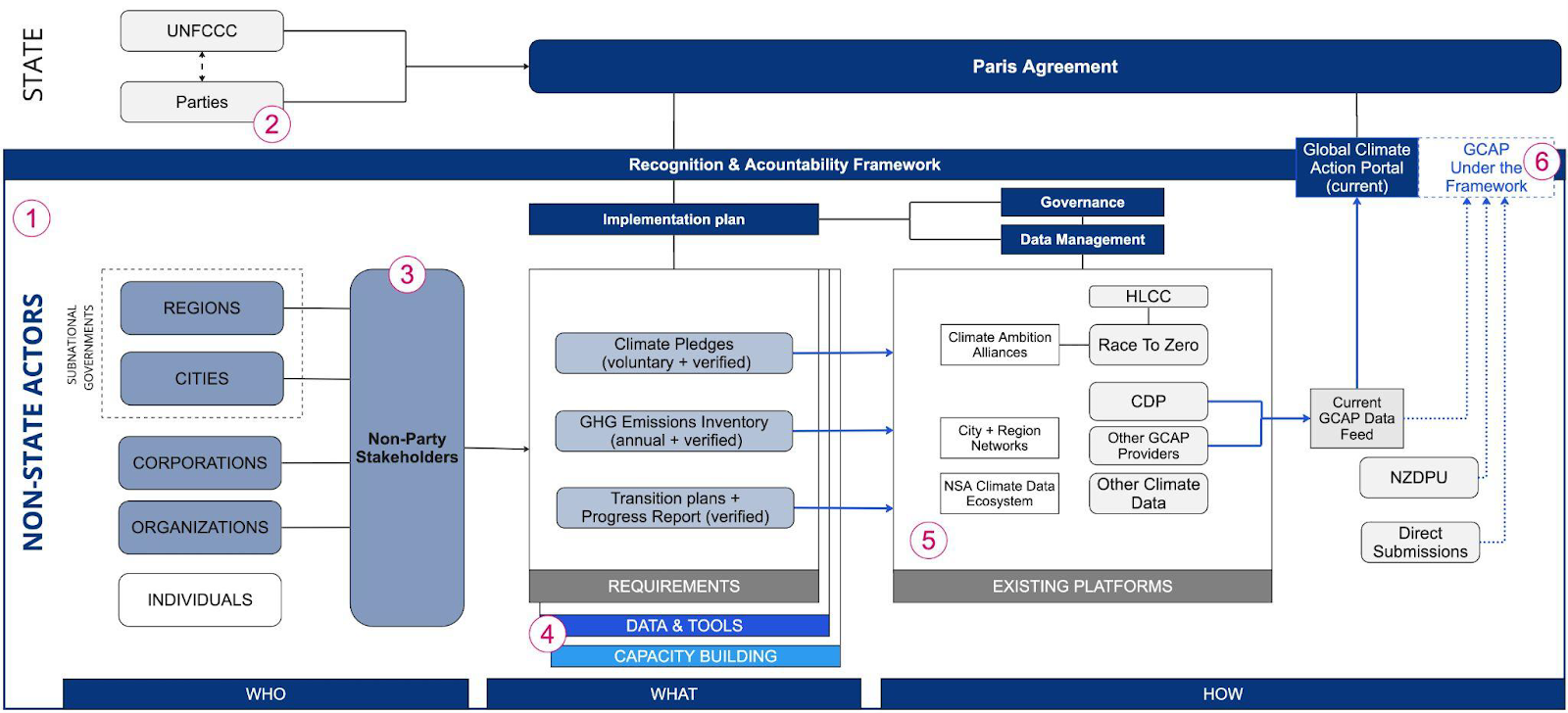
Ahead of COP28, DDL has contributed three papers to provide recommendations for how the United Nations Framework Convention on Climate Change (UNFCCC) should proceed to implement its Recognition and Accountability Framework, which was announced in June 2023 at the start of the annual Bonn Climate Conference in Germany.
Whereas UN climate transparency and accountability discussions historically focus on UN member states, the increasing number of net-zero and climate commitments by subnational governments, financial institutions, and companies necessitates similar discussions to ensure the transparency and credibility of these commitments. Responding to this need, the Recognition and Accountability Framework was created by the UNFCCC to recognize climate commitments made by non-state actors and to ensure greater transparency and credibility of those commitments.
In response to the UNFCCC’s Recognition and Accountability Framework, and partnership with close collaborators, DDL submitted three papers with recommendations to improve the focus and implementation of the framework of RAF. Although all three of the papers were written in conjunction with different partnering organizations and have different recommendations, they were all written with the intent of ensuring the Framework improves transparency utilizing data and holds non-state actors to account.
See the key context and takeaways from the submissions:
DDL: Input to the UNFCCC Non-Party Recognition and Accountability Framework (RAF)
Key recommendations:
- Clarify and explore data governance models: Explore models of open and decentralized data governance to ensure accountability. Clarity around existing data governance rules is also needed.
- Embrace emerging technologies: Generative AI, large language models, and other innovations should be leveraged to expedite our understanding of best practices.
- Enhance existing coordination: Address communication gaps and align the goals of emerging regulatory disclosure frameworks and voluntary standard setters
- Develop a unified data model: Drawing on existing standards and frameworks, clearly communicate global requirements and expectations for net-zero and climate plans.
- Promote interoperability: Metadata should also be standardized to ensure interoperability for further analysis.
Collaborators: This submission draws from a larger report DDL prepared, drawing from interviews with more than two dozen individuals from various organizations in the non-state actor data and accountability landscape.
Net Zero Tracker: Draft Implementation Plan with respect to Net-Zero Pledges of non-State actors and ‘Integrity Matters’
This submission focuses on the need to ensure that transparency and accuracy are at the core of the Recognition and Accountability Framework.
Key Recommendations:
- Enhance the Global Climate Action Portal (GCAP): Enhance the quality and quantity of data in the portal and ensure interoperability with other platforms. The portal should also be updated to improve the user interface and embed modern tools like machine learning, artificial intelligence, and augmented intelligence.
- Provide clarity about the Recognition and Accountability Framework: Clarify what the Framework will and will not do and how it interfaces with other UNFCCC initiatives.
- Ensure strong governance: Regularly assess data validators and verifiers, enable third-party error reporting, work with established net-zero criteria, and provide technical assistance with non-state actors’ net-zero plans and reporting.
Collaborators: DDL, Net Zero Tracker, Oxford Net Zero, NewClimate Institute, Energy & Climate Intelligence Unit (ECIU)
CAD2.0 Community: Public Response to UNFCCC Recognition & Accountability Framework
This submission focuses on the need to leverage digital technology to ensure non-state climate actor data, tracking, and transparency.
Key recommendations:
- Develop a common database: Encourage a digital data commons to provide a more efficient, secure platform with granular and interoperable data.
- Evolve the framework with science: Align the framework with evolving science-based norms and standards.
- Ensure longevity: Leverage sustainable finance and capacity building to ensure the longevity and success of the framework.
- Leverage existing systems: Build on existing work and partnerships to enhance NSA data reporting, standardization, accounting, and aggregation.
Collaborators: DDL, Open Earth Foundation, CAMDA workgroup

Illustrates the scope of the Recognition and Accountability Framework by mapping stakeholder, information, and data flows.

Recent Comments